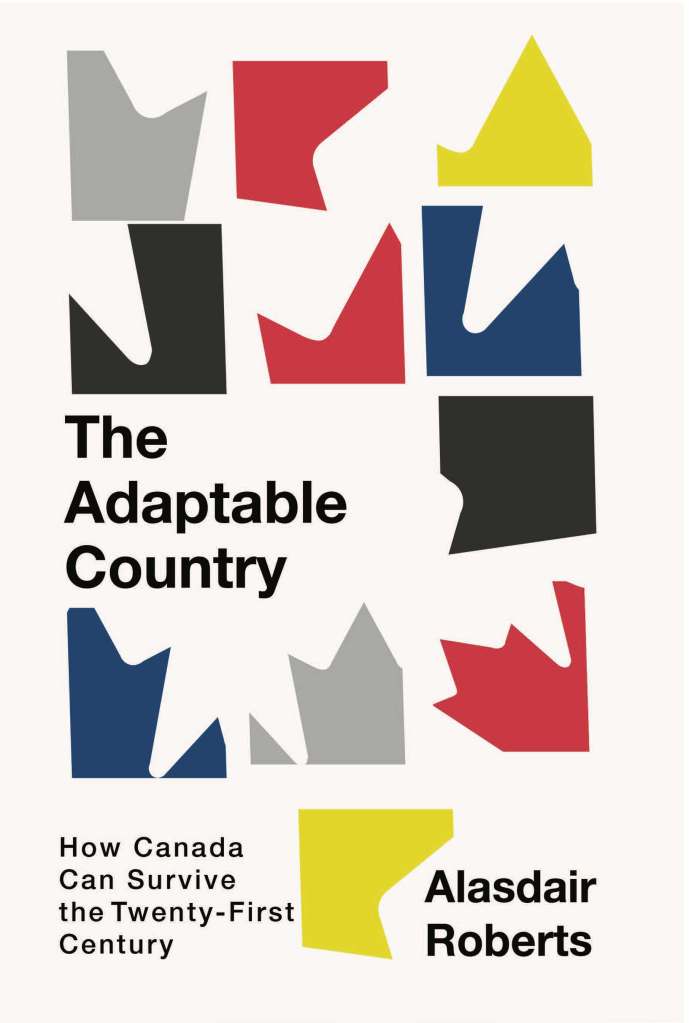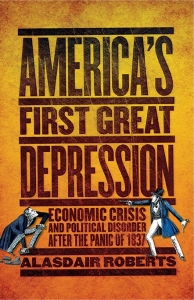Books
The Adaptable Country: How Canada Can Survive the Twenty-First Century. Forthcoming in September 2024 from McGill-Queen’s University Press, in its Canadian Essentials series. ISBN 9780228022008.
Description from the publisher here.
“Providing essential insight into Canada’s unique governance model, Alasdair Roberts urges us to face the challenges to our democratic institutions. The Adaptable Country is a must-read, opening a conversation about how the federal establishment can better work for the next generation.” – Senator Peter Harder
“A hyper-relevant call to action, as Canadians feel increasingly unsettled about our collective stability and resilience. Roberts seeks to shake us out of our complacency and think strategically about a challenging future for which we’re likely ill-prepared.” – Jennifer Ditchburn, President & CEO, Institute for Research on Public Policy
“A lively read, The Adaptable Country explores how governance has evolved in Canada. More approachable and broader in scope than much academic work in Canadian governance/public administration, it draws on key anecdotes to engage and inform a wide general readership.” – Emmett Macfarlane, coauthor of Legislating under the Charter
“The Adaptable Country offers a unique view of government and governing in Canada. Roberts examines public administration, political party, civil society, and political culture issues to assess which of these components of the system has been diminished or is currently not up to the task.” – Brooke Jeffrey, author of Road to Redemption
Pre-order on Amazon (United States).
Pre-order on Amazon (Canada)
Superstates: Empires of the Twenty-First Century. (Polity, January 2023).
Read the first pages of the book.
Details and order on the Polity website.
Order on Amazon UK.
Order on Amazon US.
“Analysts focus on what the world’s largest and most powerful countries can do to confront climate change, pandemics, and other dangerous threats. Roberts’s Superstates flips the script and asks how these threats will affect the structure, borders, and even existence of the world’s most populous countries. Drawing from the history of empire, the book is a sobering warning of the difficulties our unprecedentedly complex ‘superstates’ will face to survive the next century unscathed.” — Ian Bremmer, President of Eurasia Group.
“[Roberts] offers an insightful account of superstates’ internal governance and a thoughtful exploration of their similarities in diversity, fragility, leadership structures, and ideology.” — Foreign Affairs, May/June 2024.
“This book is expertly informed, extensively well documented, crafted for interesting study, and importantly useful for professional and popular understanding.” – International Journal of Public Administration.
“Superstates is engaging, lucid, judicious, well documented, and highly accessible. For those interested in, or troubled by, the abiding dilemmas of contemporary government and governing, whether as researchers, students, and practitioners, Superstates will serve as an invaluable resource.” — International Review of Public Administration.
“The book serves as an invaluable resource for researchers, students and practitioners grappling with the enduring dilemmas of contemporary government. Readers will find his discussion to be eloquent, perceptive and enlightening.” — Global Public Policy and Governance.
“Empires are supposed to be a thing of the past, yet in some ways the empires we knew are still with us. The largest states in the world have the scale of empires but, Roberts suggests, they are a new breed . . . Roberts is sceptical that his four superstates will all exist in their present form in a hundred years’ time.” — London Review of Books.
“Superstates finds a nice balance between academic curiosity and practical utility and overcomes the limitations of comparative political definitions to identify real challenges shared across four distinct political structures. It is a useful framework for looking at what will be a very dynamic period of both domestic and international politics.” — Diplomatic Courier.
“With a groundbreaking twist in thinking about the art and methods of statecraft, Roberts considers the decisions leaders must make to devise and redevise strategies for governance at such a grand scale.” — Politics Today.
“A provocative read built on fascinating historical and contemporary evidence that any history or political science student will enjoy.” — Trent Engbers, University of Southern Indiana.
“A fascinating and provocative account of the governance challenges facing the rulers of today’s four ‘superstates,’ who must grapple not only with the issues that have beset imperial rulers over the centuries, but also those arising from modern technology and culture.” — Christopher Hood, University of Oxford
“Superstates looks ahead at the future of governance, where more and more people will be crammed into a few massive polities. Roberts shrewdly considers the lessons from past empires and the challenges of running a modern nation state. The result is an extraordinarily accessible, insightful and challenging field guide to governance around the world in the coming decades.” Donald Moynihan, McCourt Chair of Public Policy, Georgetown University.
“Are ‘Superstates’ governance utopias or dystopias? And are they self-denying or self-fullfilling? We, the people, want to know. This book makes us understand what to do, and even more, what not to do.” — Geert Bouckaert, KU Leuven Public Governance Institute.
Strategies for Governing: Reinventing Public Administration for a Dangerous Century. ISBN: 9781501714405. Cornell University Press, December 2019. Purchase on Amazon. Excerpt here. Flyer and discount from the Press.
Description from the Press: “With the fields of public administration and public management suffering a crisis of relevance, Alasdair Roberts offers a provocative assessment of their shortfalls. The two fields, he finds, no longer address urgent questions of governance in a turbulent and dangerous world. Strategies for Governing offers a new path forward for research, teaching, and practice. Leaders of states, Roberts says, are constantly reinventing strategies for governing. Experts in public administration must give advice on the design as well as execution of strategies that effective, robust and principled. Strategies for Governing challenges us to reinvigorate public administration and public management, preparing the fields for the challenges of the twenty-first century.”
Recommended — Choice, October 2020.
2021 Book Award, Section on Public Administration Research, American Society for Public Administration. Details here.
“This brief, clearly written book is a must read for academics and an essential addition to the required reading for public administration graduate students.” — Journal of Military and Political Sociology, February 2022.
“This is a thought-provoking book, one that deserves the attention of everyone in the field of public administration.”– Teaching Public Administration, April 2021.
“The argument’s timeliness is uncanny . . . Roberts’ book is a real bottomless well of research ideas ready to be pursued by scholars, especially junior ones. The book would also be useful for directors of graduate programs in PA interested in equipping students with the mindset and tools to address the big picture.” Political Science Quarterly, June 2021.
“[Roberts] has nudged us in the right direction to reawaken why public administration . . . is a field uniquely situated to link theory and practice at a macro-societal level . . . On that point alone, we all owe Roberts a great intellectual debt.” — Journal of Public Administration Research and Theory, October 2020.
“Roberts succinctly makes a timely case in favor of large concerns about governing . . . While dealing with currently urgent realities of the field, the analysis makes a contribution to last.” — American Review of Public Administration, June 2020.
“Roberts is masterful at distilling complex concepts into a digestible format, through which both new students and senior scholars can engage and argue. The book provides an opportunity to have a critical conversation about the boundaries of Public Administration.” — Governance, July 2020.
“Strategies for Governing has broad implications for research, teaching, and practice in a variety of disciplines and subfields. The book’s insights provide readers with fresh perspectives on important research questions in public administration, public policy, American politics, international relations, and comparative politics. Perhaps most notably, Roberts encourages us to return to first principles and to address the ‘what’ and ‘how’ of government.” — Perspectives on Politics, August 2020.
Can Government Do Anything Right? Cambridge, UK: Polity Books, 2018. ISBN 978-1-5095-2151-7. Polity webpage. Order on Amazon.

“Alasdair Roberts’ pithy, accessible, and refreshingly non-partisan book offers a pragmatic yet optimistic view of the benefits and future of government. While thoughtfully acknowledging a broad range of complaints about the representativeness and effectiveness of Western democracies, Roberts persuasively counters by pointing out the undeniable progress and accomplishments of these governments. His broad thesis–that democratic institutions work because they adapt to changing circumstances, often in unexpected ways–should provide both hope and inspiration to students and readers who despair about our current situation.” — Dean Sherry Glied, Wagner School of Public Service, New York University.
“This contrarian work is a welcome corrective to the doom and gloom commentary that is so common today. Not only that, it’s a good read as well. It will get an intensive workout in college seminars.” — Morris P. Fiorina, Stanford University
“Governing, particularly in democracies, is difficult and often frustrating work. In this vital new book, Alasdair Roberts explains why by identifying the multiple constraints imposed on political leaders. More importantly, he makes a convincing case that, over time, Western governments have successfully adapted to these constraints and have been largely effective at addressing the challenges they face. At a time when so many citizens are disenchanted with their governments, the argument in this book deserves a wide audience.” — Stephen K. Medvic, Franklin & Marshall College
“In a world dominated by narratives of democratic crisis and decline Alasdair Roberts reveals the innate complexities of modern governance and political statecraft. In a book that is as clear and accessible as it is intellectually thoughtful and provocative, Roberts offers a positive and optimistic account of contemporary politics. It offers an energizing breadth of fresh air in what is otherwise a fairly gloomy scholarly space.” — Matthew Flinders, University of Sheffield.
Four Crises of American Democracy: Representation, Mastery, Discipline, Anticipation. New York: Oxford University Press. January 2017. Details from OUP here. Order on Amazon. Watch a video about the book on YouTube.

“Roberts’ thoughtful and elegant defense of democracy is to be welcomed . . . it is a refreshingly accessible read and a much-needed reminder both to social scientists and citizens in general about the importance of paying attention to history and what it can teach us about democracy.” Public Administration Review, May/June 2017.
“To merely say this book is prescient would be doing a disservice to the text; its relevance and accuracy in describing our national climate is almost unnerving. . . . This is a book for citizens who care about democracy and find beauty and excitement in the fragility of this ‘great experiment.'” Public Integrity, April 2017.
“Roberts’ overview of American democracy and how it has adapted and changed over the years is both very enjoyable and thought-provoking. . . . Roberts’ book is a reminder of the enduring (though not unassailable) stability of democracy, and the more basic issues always surrounding it.” The Complete Review, February 2017.
“This is a brilliant book and a much-needed antidote to ‘the politics of pessimism’ that swirls around so much scholarly writing and media messaging.” LSE Politics & Policy Blog, May 2017.
The End of Protest: How Free-Market Capitalism Learned to Control Dissent. Ithaca, NY: Cornell University Press, 2013.
“If you care about your rapidly disappearing right to peacefully protest in the U.S. and the U.K., read this book.” — CriticalMargins.com
“Roberts convincingly argues that in the last three decades, the two countries that led the free-market revolution–the US and Britain–have invented new strategies for dealing with unrest over free market policies.” — Economic Sociology and Political Economy.
- Short YouTube video from Cornell University Press.
- Cornell University Press page.
- Purchase on Amazon.com.
America’s First Great Depression: Economic Crisis and Political Disorder after the Panic of 1837 (Ithaca, NY: Cornell University Press, April 2012). Chinese translation from SDX Joint Publishing, 2019: Amazon.
- Read Publishers Weekly review, January 30 2012
- Read Library Journal review, April 1 2012
- Legal Talk Network podcast about America’s First Great Depression, January 2012.
- Short YouTube video from Cornell University Press.
“America’s First Great Depression is an intriguing history of American financial policy in the 1830s and 1840s. Alasdair Roberts’s contention that international financial considerations shaped U.S. policymaking is well sustained, the writing is sprightly, and the argument is nicely documented with a wealth of judiciously culled evidence.” — Richard John, Columbia University.
“Alasdair Roberts tells a wide-ranging story of the depression that began in 1837 with lucidity, emphasizing the role of global financial markets and finding plenty of analogies to the economic problems of today.”— Daniel Walker Howe, Pulitzer-Prize-winning author of What Hath God Wrought: The Transformation of America, 1815–1848.
The Logic of Discipline: Global Capitalism and the Architecture of Government (New York: Oxford University Press, 2010)
Honorable mention from the Best Book Award 2011 selection committee of the Section on Public Administration Research (SPAR), American Society for Public Administration.
“A tour de force which deserves to be read and debated. It has a grand synthetic sweep which is rare enough in scholarship these days, and it makes an important, imaginative contribution to our efforts to understand the forces shaping public policy in the last three decades.” Public Administration, December 2012.
“This concise and provocative book has a readability that belies its dense subject matter. . . . [A] revealing exploration of the democratic deficit that lingers at the core of many of our society’s major institutions.” Times Literary Supplement, November 26, 2010.
- Read the first chapter
- Full-text search (from Google Books)
- Oxford Scholarship Online
- Bibliographic data and availability in libraries (from WorldCat)
- Purchase from Amazon.com
- YouTube video from Suffolk University.
- Legal Talk Network podcast about The Logic of Discipline, March 2010.
La lógica de la disciplina: el capitalismo global y la arquitectura del gobierno. México: CIDE, 2018. Preview the book on Google Books. Translation of The Logic of Discipline (2010), below, with new introduction by Mauricio Dussauge Laguna. Amazon.
The Collapse of Fortress Bush: The Crisis of Authority in American Government (New York: New York University Press, 2008)
“Recommended. Roberts’ sound judgment and expertise in the field of public administration make this an excellent primer on governance in the Bush years.” Choice, September 2008.
“A trenchant analysis of the last eight years of American political history. . . . A work of rare insight that fills gaps glaringly evident in most public discourse.” Kirkus Reviews, November 1, 2007.
“Highly recommended. Roberts offers a provocative and intriguing thesis . . . and carefully develops his argument with examples and compelling logic.” Library Journal, February 1, 2008.
- Bibliographic data and availability in libraries (from WorldCat)
- Full-text search (from Google Books)
- Sample chapter (from New York University Press)
- Purchase from Amazon.com
- Reviews
Blacked Out: Government Secrecy in the Information Age (New York: Cambridge University Press, 2006)
Charles H. Levine Memorial Book Prize, Research Committee on the Structure of Governance, International Political Science Association; Best Book Award, Public and Nonprofit Division, Academy of Management; Annual Book Award, American Society for Public Administration, Section on Public Administration Research; Louis Brownlow Book Award, National Academy of Public Administration.
- Bibliographic data and availability in libraries (from WorldCat)
- Full-text search (from Google Books)
- Sample chapter (from Cambridge University Press)
- Purchase from Amazon.com










